#Arnold Schoenberg
Text

Arnold Schoenberg - Red Gaze (1910)
1K notes
·
View notes
Text
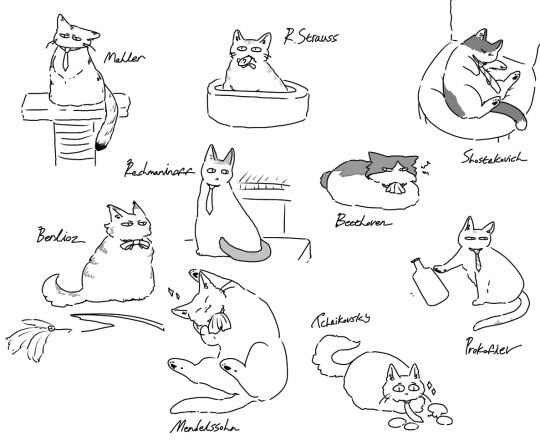
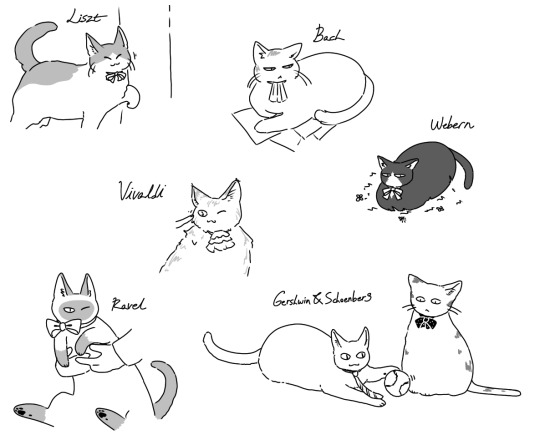
Catpawsers
#classical composers#gustav mahler#richard strauss#dmitri shostakovich#hector berlioz#sergei rachmaninoff#ludwig van beethoven#sergei prokofiev#felix mendelssohn#pyotr ilyich tchaikovsky#franz liszt#johann sebastian bach#antonio vivaldi#anton webern#maurice ravel#george gershwin#arnold schoenberg
96 notes
·
View notes
Text

from Alex Ross’ old blog. yeah that James Dean
11 notes
·
View notes
Text

Arnold Schoenberg, September 13, 1874 – July 13, 1951.
1905 portrait by Richard Gerstl.
29 notes
·
View notes
Photo
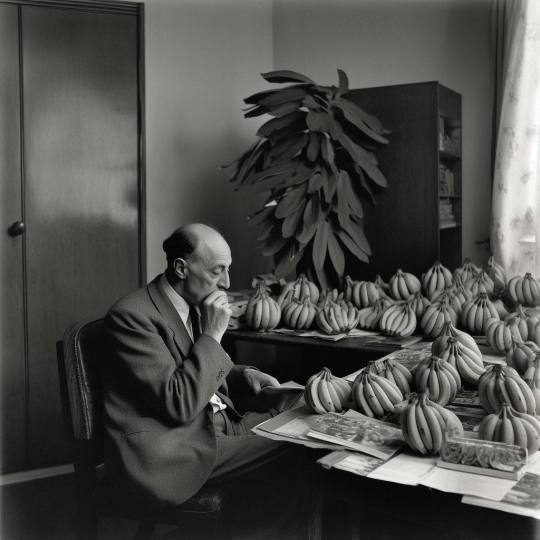
Arnold Schoenberg considering bananas.
72 notes
·
View notes
Text
“Arnold Schoenberg has said that "music is not a sound but an idea," but ordinary people can't listen to it that way.”
― Haruki Murakami, Absolutely on Music: Conversations with Seiji Ozawa
15 notes
·
View notes
Photo
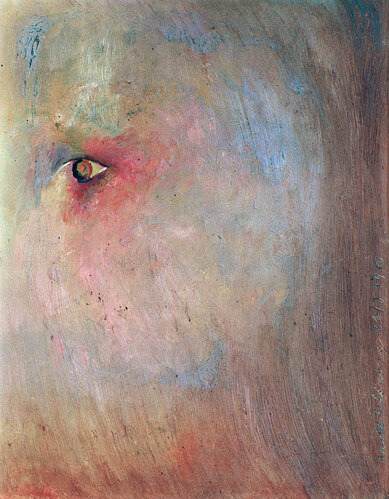
Arnold Schoenberg, Red Gaze, ca. 1910, oil on cardboard, 22 x 28 cm, Arnold Schönberg Center, Vienna, Austria.
83 notes
·
View notes
Text
youtube
One of the most wonderful conductors in the world- Emilio Pomarico- conducting a reduction of Arnold Schoenberg's magnificent Five Orchestra Pieces, Op. 16 with Klangforum Wien. I confess that I'm a bit biased here in that I had the great pleasure and honor of having studied with Emilio, who himself had studied with the great Sergiu Celibidache (conductor of the Berlin Phil before Karajan and then for many years, the music director of the Munich Philharmonic). For any aficionados of avant-garde 20th c. & contemporary music, you can find a huge amount of Pomarico's recordings of new music, always impeccably performed under his direction with a number of German orchestras and especially with the new music group, Klangforum Wien on various music channels as well as YouTube.
#emilio pomarico#arnold schoenberg#celibidach#klagforum wien#peyman farzinpour#classical music#classical composer#Youtube
10 notes
·
View notes
Text
El lenguaje utilizado en Moisés y Aarón es notablemente personal. Se mantiene alejado de los ritmos y la tonalidad de la Biblia de Lutero. El 5 de agosto de 1930, Schönberg escribió a Berg: «Soy de la opinión de que el lenguaje de la Biblia es el alemán medieval, el cual, siendo oscuro para nosotros, debería utilizarse a lo sumo par dar color; y eso es algo que no necesito». Por encima de todo, cada palabra alemana, ya sea en el Sprechgesang (canto declamatorio), en el canto directo o en la declaración coral, encaja de forma única y precisa en el contexto musical. La letra no está menos durchkomponiert («plenamente compuesta, musicalizada») que la música. Esto es lo que hace que cualquier decisión de producir el Moisés y Aarón en inglés resulte tan descaminada. Alterar las palabras –su cadencia, su énfasis, sus tonalidades–, tal como ha de hacerse en la traducción, equivale a alterar las relaciones tonales o la orquestación en una pieza de la música clásica.
— George Steiner, «Moisés y Aarón de Schönberg» en Lenguaje y silencio. Ensayos sobre literatura, el lenguaje y lo inhumano. Traducción de Miguel Ultorio, Tomás Fernández Aúz y Beatriz Eguibar.
#george steiner#lenguaje y silencio#arnold schoenberg#language and silence#miguel ultorio#tomás fernández aúz#beatriz eguibar
15 notes
·
View notes
Text
Arie aus dem Spiegel von Arcadien // Nick Buzz
Music by Arnold Schoenberg; text by Emanuel Schikaneder
Six Shooter Records, 2003
#arnold schoenberg#arnold schönberg#martin tielli#brettl lieder#emanuel schikaneder#arie aus dem spiegel von arcadien#nick buzz#audio
5 notes
·
View notes
Text

FIVE CONTEMPORARY COMPOSERS
GIACINTO SCELSI, GYÖRGY LIGETI, PIERRE BOULEZ,
KARLHEINZ STOCKHAUSEN, ARNOLD SCHOENBERG
conceptual graphics
See full project -> https://jackiebranc.site/five-contemporary-composers/
#elloon#jackie branc photographer#graphic design#computer graphics#pierre boulez#györgy ligeti#Giacinto Scelsi#Karlheinz Stockhausen#arnold schoenberg#conceptual#conceptural art
10 notes
·
View notes
Text

OTD in Music History: Legendary 20th Century "classical" composer, theorist, and pedagogue Arnold Schoenberg (1874 - 1951) dies at his home in Los Angeles.
After being forced to retire from a professorship at UCLA, Schoenberg took a trip up to Santa Barbara in the summer of 1948 to teach and lecture for several weeks at the Music Academy of the West. In an interview that he granted to a local newspaper, Schoenberg reiterated his fervent belief in the need to "educate" the general listening audience in an effort to help them appreciate "new music."
The journalist interviewing him noted that "[d]espite his 73 years of age, and his eminence as a composer… Schoenberg is far from [being] the ‘old fogey’ in his musical tastes.” Perhaps to underscore this point, the article was illustrated with a photograph of Schoenberg smiling radiantly beneath some palm trees at the MAofW (albeit while dressed up in a full suit and tie and with his hands planted firmly on his hips, just like an old fogey).
The story of Schoenberg's death several years later is a sad one:
Schoenberg's suffered from intense triskaidekaphobia (fear of the number 13) and he had long feared that he would die during a year that was a multiple of 13 -- but on his 76th birthday, an astrologer wrote Schoenberg a note warning him that the upcoming year was a critical one, because "7 + 6 = 13." This stunned and depressed Schoenberg, because previously he had only been wary of multiples of 13 and he hadn't considered adding the digits of his own age together. He suffered a heart attack late in the evening of Friday, July 13th, after spending all day in bed in a state of panic. As his wife later recounted: "About a quarter to twelve, I looked at the clock and said to myself, ‘Another quarter of an hour and then the worst is over.’ Then the doctor called me... Arnold's throat rattled twice, his heart gave a powerful beat, and that was the end..."
PICTURED: A copy of the photo that illustrated the article mentioned above, which Schoenberg signed and dated ("August 1948").
#opera#classical music#music history#bel canto#composer#classical composer#aria#classical studies#classical singer#Arnold Schoenberg#Schoenberg#classical composers#classical musician#classical musicians#classical history#chest voice#maestro#historian of music#Suite#Concerto#Concert#piano#Romanticism#Orchestra#Violin#Chamber#Sonata#Verklärte Nacht#Serenade#Song
8 notes
·
View notes
Text
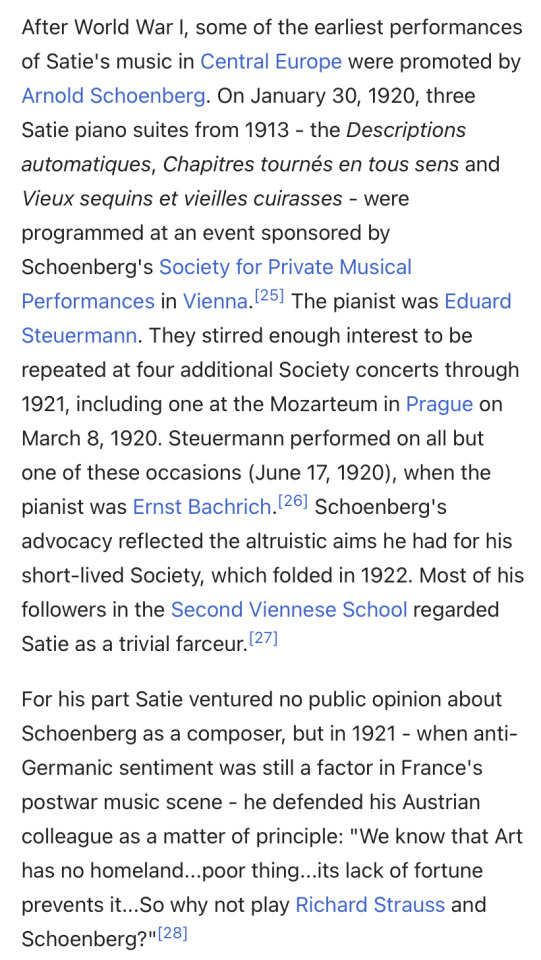
interesting note from wiki
#Erik Satie#Arnold Schoenberg#that description of the 2nd Viennese school is I think true if you take the entire school#Berg admired Satie at least somewhat; Webern I don’t know#tho ironically Cage’s whole aesthetic rests on seeing a fundamental similarity between the two of them
43 notes
·
View notes
Text

Theodor Adorno, in a 1956 lecture on the counterpoint of Arnold Schoenberg.
3 notes
·
View notes
Text
the problem with jacob collier is he's desparately trying to have his music also have some profound meaning instead of just trying to make the craziest creations musically possible. he should come up w things like schoenberg's 12 tone method that push the boundaries of western music
4 notes
·
View notes
Text
Each of these “intensely charged memorials in sound,” Eichler writes, is “a prism through which we ‘remember’ what was lost.” That’s a weighty burden to place on any piece of music, not to mention on a listener. There are many for whom nonnarrative works—Bach’s Goldberg Variations, say, or a Beethoven string quartet—represent, in their very abstraction, the epitome of pure musical meaning. For such people, this kind of musical memorializing is bound to seem uncomfortably freighted—art with an agenda, relying on extra-musical cues for its significance. Not everyone wants a musical experience to conjure images of violence and grief. Eichler seems to acknowledge this, at one point posing the question “Should genocide really be the stuff of a night out at Carnegie Hall?”
In 2001, shortly after the September 11th attacks, I found myself confronting similar questions when the New York Philharmonic asked me to compose a work to honor the victims who died in the World Trade Center. I was initially reluctant to accept. It seemed too soon: How could one create music to “commemorate” a public trauma that the nation was still processing? At the same time, it felt wrong to say no. Surely a composer ought to be able to respond to a public need; if firefighters and first responders were risking their lives at Ground Zero, the least I could do was answer the call. The resulting work, “On the Transmigration of Souls,” was agonizing to compose, not just because I spent months meeting with grief-stricken families and reading their accounts but also because I found it nearly impossible to fix on a voice for the piece. The media was still hectically recycling images of the catastrophe, to the point where any real meaning had been leached from them. In the end, I made what I termed a “memory space”—a mostly quiet piece for orchestra and a chorus of adults and children which incorporated prerecorded sounds of the city and the murmured recitation of names and phrases from missing-persons signs. The piece had its première on September 19, 2002, almost exactly a year after the event that prompted it.
#music#tragedy#catastrophe#john adams#on the transmigration of souls#september 11th#9/11#johann strauss#arnold schoenberg#dmitri shostakovich#benjamin britten
3 notes
·
View notes